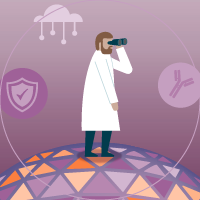Revolutionizing the treatment of cancer with allogeneic CAR-T cell therapy
Immuno-Oncology Insights 2024; 5(4), 89–94
DOI: 10.18609/ioi.2024.014
CAR T-cell therapy has revolutionized cancer treatment, with autologous approaches marking a breakthrough in blood cancers. However, barriers like long manufacturing times, high costs, and limited durable efficacy still limit their full potential impact. Allogeneic CAR T-cell therapies, derived from healthy donor cells, offer a promising alternative by providing pre-manufactured, scalable treatments that can be delivered rapidly to the patient, potentially expanding patient access and improving outcomes.
While challenges like immune rejection and graft-versus-host disease remain, innovative strategies are underway to optimize the safety and persistence of these therapies. Atara is leveraging Epstein-Barr virus-sensitized T cells that avoid traditional gene editing and include clinically validated technologies that aim for improved persistence, potency, and safety. Now in Phase 1 trials, this platform represents a next-generation shift towards scalable and accessible allogeneic CAR T-cell therapies, advancing the fight against cancer.
